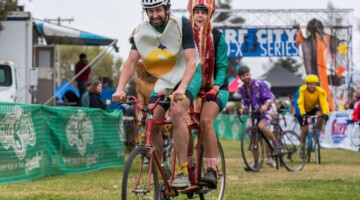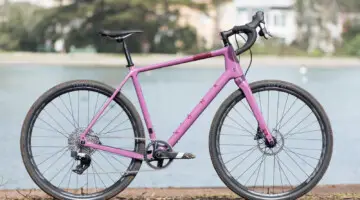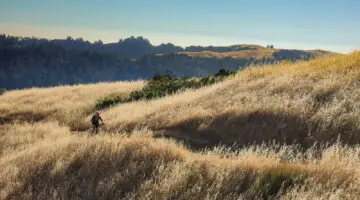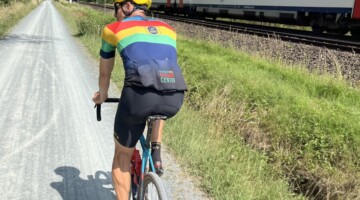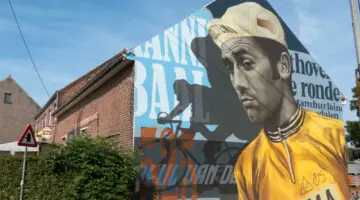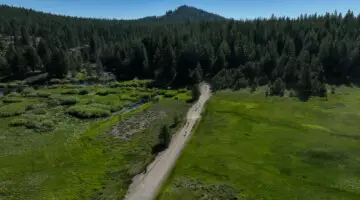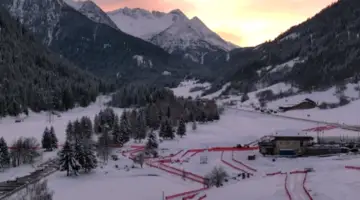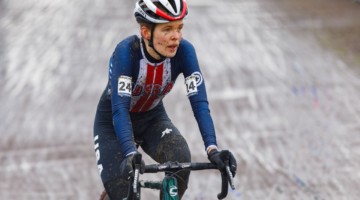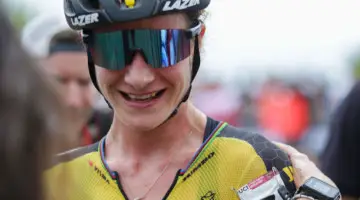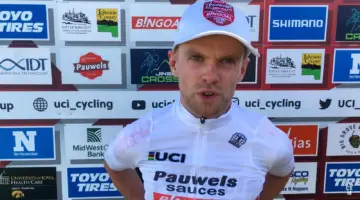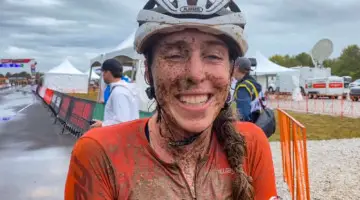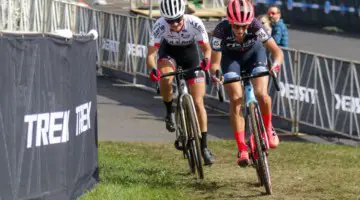While the world focused on the Winter Olympics in Pyeongchang, one familiar face was paying extra close attention. Prior to her years as cyclocross and mountain bike star, Katerina Nash was a cross country skier racing for the Czech Republic. Nash represented her home country at the 1998 Nagano and 2002 Salt Lake Olympics. In 2002, she came close to a medal when her 4 x 5km relay team finished fourth.
With an increasing number of cyclocrossers targeting the 2020 Tokyo Olympics for mountain biking, it is hard to think of a better source of advice than Nash. She also competed in the mountain bike races at the 2012 London and 2016 Rio Olympics. She finished fifth in Rio, so after a fourth and a fifth, maybe it won’t be a surprise if she goes for a medal in 2020?
After Jessica Diggins and Kikkan Randall’s thrilling win in the Women’s sprint relay—the first U.S. medal in cross country skiing since 1976—we reached out to Nash to ask her thoughts on this year’s Olympics, her current skiing habits, using skiing as training, U.S. Nationals and more.
Interview with Katerina Nash on Olympic Cross Country Skiing and More
Cyclocross Magazine: This was a big year for U.S. cross country skiing at the Olympics. How much did you watch?
Katerina Nash: I saw all the cross country ski events. It was very exciting. I try to catch most of the World Cups too.
CXM: What are your thoughts about the Olympic racing this year? Are there any American, Czech or other skiers you’re in touch with?
KN: I raced with Kikkan Randall when I was finishing my ski career in the U.S. I only know the rest of the world’s racers from watching TV. A few years ago I still had several Czech teammates racing the World Cup. It sure was fun to watch their careers.
CXM: Which events were your best when you raced? Were you better at classic or skate?
KN: I broke my ankle when I was a teenager and that really limited my classic skiing. I was a better skater, but I really enjoyed both and always tried to work on improving my classic skiing.
I was a little better at longer distances: 10k, 15k and 30k. Five kilometers were a little too short for me, but I could always crank it up during relay races. Sprints were just starting when I was finishing my World Cup career, and so I only got to do couple. I did enjoy the sprint relay and together with my teammate won the introductory team sprint event at the World Cup. It wasn’t considered a World Cup race, but with its initial success it was added later and now it’s one of the most watched events.
CXM: How has the sport changed since you stopped competing?
KN: There is lot more mass start racing now, more sprints and a lot less time trial racing than when I started. Cross country skiing is lot more exciting to watch these days, and I would really like the style of racing now.
CXM: Are there tactical overlaps between bike racing and ski racing?
KN: Yes, now there is lot more tactics. Before it was more like put your head down and try to catch the skier who started 30 seconds before you.
CXM: If cyclists are going to incorporate skiing as winter training, how would you recommend they do it? Classic? Skate? How much?
KN: I think cross country skiing is great training. I think the best thing to do is take a clinic before ski season starts. There are lot of technique tips you can work on, and it’s good to start with the right idea instead of trying to eliminate bad habits later on. I typically teach a clinic or two in Tahoe if anyone wants to join next year! Cyclists have a unique style when skiing and I can pick them up from far away pretty much every time.
I would say any time on skis is a good time, but it really depends on where you live and how early in the spring you need to be ready for bike racing. One thing about skiing is the overall fitness is very good but sooner or later everyone needs the bike-specific fitness from miles on the bike. I would certainly recommend going skiing over riding indoor, but there is no specific amount I ski year to year. It mainly depends how late I go with my cyclocross season and how early I have to start mountain bike season. I assume I’ll ski lot more when I’m not bike racing.
CXM: The Sierra have had limited snow this winter but a big storm seems to have finally arrived. When there’s snow how much do you still cross country ski? What about downhill?
KN: I haven’t skied much yet this year. I’m hoping to finally fit more in next week before the bike season gets going again. I prefer cross country and backcountry skiing, to be honest. Occasionally, I do downhill but prefer hiking if I’m up in the mountains. I also do a lot of skiing with my dogs on my classic crowns. I pretty much go anywhere there is snow for that.
CXM: Is cyclocross becoming an Olympic sport key to the sport’s development? Here in the U.S., athletes in Olympic disciplines are getting more support from USA Cycling, the Olympics get good viewership …
KN: I think we need to keep pushing for the cyclocross at the Olympics. Many of us see it as a perfect fit. I obviously like the Winter games, but I think there are way too many judged sports, tournaments and time trial-style races. Apart from cross country skiing and biathlon, you no longer have a group of people starting all together and fighting until the end.
With cyclocross, you get a great show in just one hour. I think even the winter athletes would enjoy checking it out. Many times athletes ride bikes to get around the Olympic village, so bikes wouldn’t really look so strange and we could even have the race near the village for everyone to enjoy.
The benefits of cyclocross being at the Olympics would be massive for the sport as well. It would help to grow the sport and all the federations would pay the same attention to cyclocross as other cycling disciplines, which would be really nice.
CXM: How did your first meetings as representative on the UCI Commission go? Are there any changes we can expect coming down the road?
KN: I have gone to three meetings so far. One athlete commission, one cyclocross commission and I stopped in at the management meeting the day before Worlds. Another cyclocross commission is next week, but I won’t be traveling to that one, although I have talked to them on the phone.
There are always new things being discussed and issues the sport is dealing with. I think cyclocross is in very good hands and there are some great people both at UCI and the commission that have a good long-term vision. We are all fighting for better cyclocross, but as I’m learning through this process things don’t happen overnight. We just can’t change everything right away. It’s been interesting to take a look from other perspective, not just the racer perspective. I’m excited to be involved and I hope we can continue to grow the sport at manageable rate and get more people excited about it.
CXM: Equality in Women’s cycling has improved in recent years. What work toward equality do you think you can accomplish during your time on the Commission?
KN: Equality has been a long process in all fields. I’m excited about cycling these days as we have made some good steps. Having said that, there is still a lot of work to do. For example, when I started to race cyclocross we were getting paid equal at the USGP over ten years ago. That amazing series went away, and I learned that equal prize money didn’t really exist in all of cyclocross, just the USGP series. Several U.S. promoters started to pay equal prize money and with petitions and pressure coming from the racers the rest continued. Little by little, U.S. cyclocross became the leader of equality in the sport and continues to do so with Trek paying equal prize money for the first time ever at World Cup last year.
As you can see from USGP to now, it’s been a long time but at least these days we are speeding up the process and the world is paying attention. It is important for us female racers to work together and keep fighting for equality.
However, I believe the most important thing to do is to have a good product that people want to know more about and want to invest in! For anyone who is paying attention to women’s ’cross, I don’t have to explain the product is great. We have a very competitive field with many interesting players and it’s been exciting to watch and be part of it for last few years. We have to keep doing a good job on that front and the rest will follow. I promise to keep fighting for us ladies with the voice I have been given at the UCI as well.
CXM: Did you watch U.S. Nationals? What do you think about the Women’s race and the success U.S. women are having?
KN: The U.S. women have done a great job the last few years. It’s been very impressive to watch Katie Compton taking the title year after a year. I think she is an amazing racer and I have a lot of respect for her continuing streak.
To be honest, I was hoping for a little bit of a battle this year at U.S. Nationals. There are a whole bunch of younger riders who have done well at the World Cups, and I thought they would give Katie bit of a harder time. Katie was well prepared and once again rode away with it and earned the title. Maybe next year?
I watched some of the events between my own workouts and dog walking. I was able to catch most of the action. I was a little bit sad to not be able to stay in Reno for the weekend but I had my own races coming up and wanted to be prepared so I decided to head back to the Bay Area and train. I was excited to see such a big event come to my area, and I think people enjoyed it and the promoters did a great job with it.
CXM: Thoughts about the course and race at Worlds? Have you done a tougher race either in ‘cross or skiing?
KN: I liked the Worlds course. I always prefer more extreme courses and I like mud. I thought the course was very interesting and hard. The conditions were changing, and I like it when you have to think about how to change and adapt your lines during the race. It was engaging course and I enjoyed riding it.
My bike, unfortunately, didn’t like the extreme conditions, and I ended up with mechanical on the last lap. Dropping from 5th to 12th was pretty frustrating. I still can’t figure out how to remove the long spikes that got pushed through the soles of my shoes during the extra run that included some pavement. Yikes.
CXM: Thanks for your time. Hope you get a chance to enjoy the snow.
KN: Thanks!





